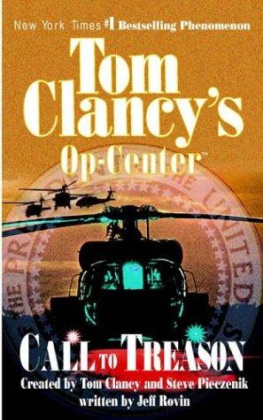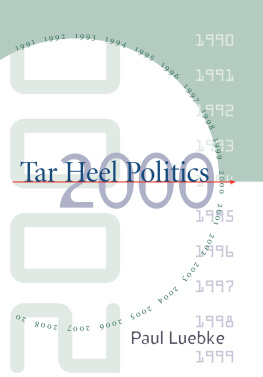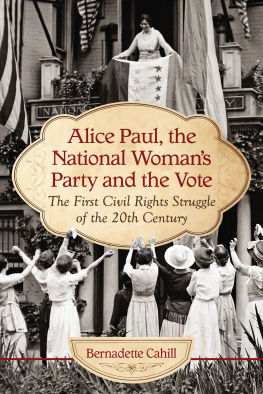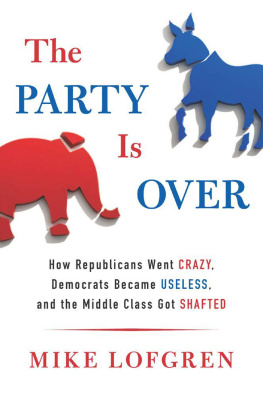Call to Treason
by
Jeff Rovin
PENGUIN BOOKS
Published by the Penguin Group Penguin Books Ltd, 80 Strand, London we2R 0RL, England Penguin Group (USA) Inc, 375 Hudson Street, New York New York 10014,
USA
Penguin Books Australia Ltd, 250 Camberwell Road, Camberwell Victoria 3124 Australia Penguin Books Canada Ltd 10 Alcorn Avenue Toronto, Ontario Canada M4V3B2 Penguin Books India (P) Ltd 11 Community Centre, Panchsheel Park, New Delhi 110 017, India Penguin Group (NZ), cnr Airborne and Rosedale Roads, Albany, Auckland 1310, New Zealand Penguin Books (South Africa) (Pty) Ltd, 24 Sturdee Avenue, Rosebank 2196, South Africa Penguin Books Ltd Registered Offices 80 Strand London we2R ORL, England www.penguin.com First published in the United States of America by Berkley 2004 First published in Great Britain by Penguin Books 2004 Copyright Jack Ryan Limited Partnership and S&R Literary Inc, 2004 All rights reserved - - - ISBN: 9780425195468
The moral right of the author has been asserted op-center1m is a trademark of Jack Ryan Limited Partnership and S&R Literary, Inc
TOM CLANCY'S OP CENTER CALL TO TREASON
This is a work of fiction Names, characters, places, and incidents either are the product of the author's imagination or are used fictitiously, and any resemblances to actual persons, living or dead, business establishments events or locales is entirely coincidental Printed in England by Clays Ltd, St. Jves plc Except in the United States of America, this book is sold subject to the condition that it shall not, by way of trade or otherwise, be lent, re-sold, hired out, or otherwise circulated without the publisher's prior consent in any form of binding or cover other than that in which it is published and without a similar condition including this condition being imposed on the subsequent purchaser
Acknowledgments
We would like to acknowledge the valuable assistance of Martin H. Greenberg, Ph.D.; Larry Segriff; Denise Little; John Heifers; Brittiany Koren; Victoria Bundonis Rovin; Roberta Pieczenik, Ph.D.; Carl La Greca; and Tom Colgan, our editor. But most important, it is for you, our readers, to determine how successful our collective endeavor has been.
-Tom Clancy and Steve Pieczenik
ONE
Georgetown, Washington, D.C. Sunday, 9:22 p.m.
Combat was not easy. But it was easier than this.
General Mike Rodgers stood with a Scotch in his hand, wishing it were a double and that he were free to slug it down. If he were in a dark saloon with Colonel August or one of his buddies from the Department of Defense, he would. Then he would nurse the sweet buzz with a beer chaser. But he was not with his colleagues. He was at a black-tie party in a three-story town house on N Street in the exclusive Georgetown section of Washington, D.C. The first-floor ballroom was crowded with nearly two hundred politicians and socialites, attorneys and foreign dignitaries, business leaders and television news executives.
They were all gathered in small groups. Though actively engaged with the people nearest them, each individual was also listening to what was being said in the groups around them. Rodgers could see it in the way their eyes moved. They always shifted slightly in the direction they were listening. Some of these silver-haired blue bloods possessed recon skills that would be the envy of CIA field ops.
On the battlefield, a man knew who the enemy was. At a party like this, alliances could be made and remade during the course of an evening. That was true throughout Washington, but the density of power brokers from so many arenas made it more likely here. In combat, a soldier knew when the fight was over. In Washington, the conflict never ended. Even at Op-Center, where Rodgers was deputy director, friendships were routinely tested by strong differences of opinion over high-stakes operations. Trust was frayed by competition for assignments. And loyalties were challenged and often destroyed by downsizing and bureaucratic squabbles.
The conditions at Op-Center were the reason Rodgers had come to this party. Since the disbanding of Striker, Op-Center's rapid-deployment force that had been commanded by Rodgers, the general had been organizing an in-house human intelligence unit. He was not enjoying the work as much as he had hoped. Rodgers was a man of grapeshot and action, not observation and note-taking. The work was essential. It just was not for him. To make things worse, his efforts cut into the jurisdiction of Bob Herbert, Op-Center's chief of Intelligence Operations. The strain on their relationship was subtle, but the impact was not. There was no antagonism; to the contrary, they were extremely cautious around one another, like outfielders going for a high fly ball and stopping short, letting it drop between them.
When an aide to Texas Senator Don Orr had called to say the senator was interested in exploring professional opportunities, Rodgers agreed to come. So far, the three-term, fifty-eight-year-old senator had not said much more than a big, "Hello, General! Thanks for coming," before being swallowed by the party. The white-haired rancher-turned-politician said that to virtually everyone as he moved from group to group, shaking hands and kissing cheeks. All of them, Rodgers suspected.
Rodgers did not follow him, as several others were doing. Subtly, of course. They wanted to be noticed and introduced to people. They wanted to be legitimized, like made men at a meeting of the dons.
Rodgers did not know any of these people, and so he stood near the wet bar, chatting with one of the two bartenders. As a grandfather clock tolled the half hour, a woman approached from the side.
"There is only one thing worse than being a Washington outsider," she said as she asked the bartender for a Coke.
"What's that?" Rodgers asked, glancing at her.
"Being a Washington insider," she replied.
Rodgers smiled. There was a hint of Vietnamese in her strong, cultured voice, but the rest of her was pure Beltway insider.
"General Rodgers, I'm Kendra Peterson, the senator's executive assistant," she said, extending a slender hand. "I'm happy you could make it."
Rodgers's smile broadened as he shook her hand. The woman was in her mid-thirties and stood about five foot seven, with dark skin, exotic eyes, and straight black hair. She had the cool poise of someone who knew things. She was dressed in a strapless navy blue satin gown with a wide, translucent sash. Her wardrobe was seductive, but her expression said she was not interested, whoever you were.
"I'm pleased to meet you," Rodgers said. "I was beginning to wonder why I was here."
"I knew there wouldn't be much chance for you to talk to the senator, but I wanted you to get a feel for the kind of people we work with."
"I see. Care to tell me why?"
"The senator is interested in you," she said.
"But you're not at liberty to tell me more," Rodgers said.
She shook her head once.
"I've heard rumors the senator plans to make a third-party run for the White House," Rodgers went on. "Are they true?"
The woman smiled evasively. "Would you be available to meet with the senator tomorrow afternoon?"
"I might be if I knew why," Rodgers said. "I don't like to go into situations unprepared."
The woman took a sip of her drink and turned toward the room. "This town house was built in 1877, four years after Georgetown was incorporated into the District of Columbia. Do you know what it was worth then?"
"Probably less than this party cost," Rodgers said.
She grinned. "Somewhat less. Just under five thousand dollars, according to the tax rolls. Seven years ago, at the beginning of his third term, the senator bought it for $2.7 million."











